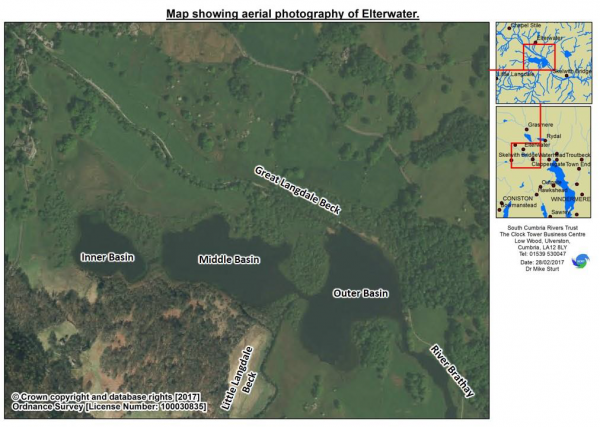Elterwater update
26 June, 2019
by Rachael Halhead
Elterwater, in South Cumbria, is formed from three connected basins and is fed by both the Great Langdale Beck and Little Langdale Beck. It also suffers poor water quality.
For approximately 40 years, up until the late 1990’s, the waste water treatment plant (WwTP) which served the village of Elterwater discharged treated water into the inner basin of Elterwater. Whilst this discharge was consented, it contributed considerable amounts of nutrients into the inner basin. Over the decades, these have accumulated and caused the lake to develop poor ecological quality with frequent episodes of anoxia (no oxygen), algal blooms and a poor habitat for the majority of species of fish and plants that should be present in this protected area. Elterwater is a Site of Special Scientific Interest (SSSI), notified under Section 28 of the Wildlife and Countryside Act 1981.

South Cumbria Rivers Trust worked with United Utilities in a joint project to remediate the lake and return it to its former glory! The project implemented a technique of hydrological flushing to divert freshwater flowing in the neighboring Great Langdale Beck and Little Langdale Beck into the inner and middle basin of Elterwater respectively, thereby reducing the residence time. It was deduced that by supplying the inner basin, in particular, with additional clean water the phosphorus in the water column would be diluted, limiting the growth of harmful algal blooms. A pipeline, to divert an additional 10,500 m³ of water, from Great Langdale Beck into the inner basin of Elterwater, was completed in January 2016.
A rigorous programme of monitoring was undertaken until the end of 2016, capturing pre-intervention data. Since the intervention, monitoring has continued monthly and initial results show that the interventions are beginning to make improvements, in particular to the water quality of the Inner Basin. The data suggests that oxygen levels at depth are improving, potentially reducing the amount of phosphorus released from the sediments into the water column. Chloropyll a concentrations, as an indicator of algal blooms, are also reducing. However, continued monitoring will be important to fully understand and quantify the effects. Monitoring will continue until 2025.
We were successful in securing funding via the Water Environment Grant to deliver further interventions on Elterwater. In 2021, Great Langdale Beck was reconnected into Middle Basin. 98% of flows were bypassing the Middle Basin and going directly into the Outer Basin after the beck was diverted in 1940’s. This isolation resulted in enhanced nutrient release from the sediments under anaerobic conditions and increased residence times contributing to the on-going degradation of the basin (APEM, 2012). By reconnecting Great Langdale Beck to the Middle Basin we will be aiding hydrological flushing by transferring well oxygenated clean water into the Middle Basin. Find out more:
Elterwater Restoration – Re-connecting Great Langdale Beck
